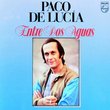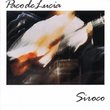| All Artists: Paco De Lucia Title: Almoraima Members Wishing: 1 Total Copies: 0 Label: Musicrama/Koch Release Date: 1/1/1993 Album Type: Import Genres: International Music, Jazz, Latin Music Styles: Latin Music, Flamenco Number of Discs: 1 SwapaCD Credits: 1 UPC: 738476279223 |
Search - Paco De Lucia :: Almoraima
 | Paco De Lucia Almoraima Genres: International Music, Jazz, Latin Music
|
CD DetailsSimilar CDs
|
CD ReviewsSetting the record straight Teye | 04/24/2001 (5 out of 5 stars) "Paco de Lucia's name will stand as one of the innovators in flamenco guitar, along with other greats like Ramon Montoya and Sabicas, and being an innovator, he will be subject to adoration as well as to harsh criticism. When Ramon Montoya brought flamenco guitar to the stage front early in the last century, all traditionalists screamed: no, no, the guitar is for accompaniment only! When Paco de Lucia introduced new harmonies and new instruments into flamenco, purists were disgusted. Now, those then-new harmonies are accepted into the flamenco dictionary, and the cajón (a south American percussion instrument that Paco brought into flamenco use only a few decades ago) is considered a "very" flamenco instrument and is being used almost universally in the art form.No one will ever be able to deny the great importance this one man has had on the development and the appreciation of the flamenco guitar, yes, of flamenco and of guitar music in general. An innovator will tread where others have not gone, and therefore will always be one step ahead of everyone else. And for that reason will be often misunderstood, certainly by those who cling to forms from the times that they themselves started appreciating flamenco.Paco de Lucia has for the past 50 years devoted his life to the flamenco guitar and culture. While other mortals spent time with their families, Paco was spreading the word on his culture, and defending flamenco against prejudice that classified it as "music of the street". He would come back from a US tour, looking forward to spending three days over Christmas with his family before flying off to Argentina, only to learn that there was TV and press-conference duty that reduced his time off to ... three hours. To us, the audience, he gave his huge and incredible work output, both recorded, and on the concert stage. It has been a sacrifice, to gain appreciation for his beloved flamenco.To me, his finest albums, the ones that I most recommend, are: "Almoraima" (1976), "Siroco" (1988) and "Luzia" (1998). Of those three to my ears, Almoraima is the first album in which Paco really outlines his signature unorthodox approach: the Alegría with the choir, the use of an oud (Arab lute), the deliberate build-up of the album as a whole, yes indeed the production (unheard of!). His albums up until this one had consisted of superior guitar playing, but in other people's mold. Here, Paco creates his own terrain, and that of many guitarists to follow. A gem, a jewel of a work where I cannot find a bad or overlooked moment.After this, Paco comes out with extraordinary albums like "Solo Quiero Caminar" and many others, in which he explores his boundaries and does some of his best playing, but always in a jazzier context.Then, he releases "Siroco": an album of so much purity, that it almost feels as if you are "there", listening to Paco play in an intimate setting. The first time I heard "Siroco" was in a very impersonal big department store in Córdoba. Tears streamed over my face during the opening song: I forgot totally where I was and let me be grabbed by this beautiful guitar playing. Well over a decade of listening to this album have not diminished its enchantment. This is to where the flamenco guitar had developed: the master first learned how to play traditionally, took an experimental and then jazzy approach, and now came back, enriched, to the roots to make a profound statement of what could be done within this traditional yet totally new idiom.Other, younger players stood up and gave Paco a run for his money. We heard the records and concerts of people like Gerardo Nuñez, Cañizares, Tomatito, and of course Vicente Amigo, and these guitar players, who started with the level and musicianship of Paco as the leading example, and current trend, of course developed it further, and impressed us all. And, well, Paco surely was resting on his laurels. Wrong. Out comes "Luzia". It is as if Paco de Lucia wanted to set the record straight: who exactly is the master of flamenco guitar? This is an album by a mature player who is in total control of both his instrument and his idiom of choice. Gone is the youthful exploration of "Almoraima", and in comes a statement so profound and personal it is almost frightening. Paco sings (!) of how his friend and long-time collaborator, gypsy singer El Camaron, has been taken away from his side (Cameron died in 1992). There are two bulerias on this cd that are so flawlessly filled with new and exciting material it is frightening. A solea that has melodies straddling the traditional compas in a way that had never been done before and yet makes total sense; a siguiryias that builds like a classical composition.... All right, the Alegría seems a reworking of that on "Siroco" (but just as great), and the Tangos (with Duquende singing) sounds a little too easy-listening to me, but all-in-all this ranks in my world as the definitive Paco de Lucia-album.To anyone who is in doubt whether to buy "Almoraima", "Siroco" or "Luzia", my honest advice is: skip dinner and buy all three." Paco de Lucia's landmark recording Ian K. Hughes | San Mateo, CA | 02/12/2003 (5 out of 5 stars) "Paco de Lucia was 28 years of age and already clearly acknowledged as the world's premier flamenco guitarist ( a position he has yet to relinquish ) when in 1976 he recorded "ALMORAIMA", a work that pays unprecedented ( in flamenco music ) attention to production values while displaying a number of other unique characteristics. Building on the instrumentation displayed on "Entre Dos Aguas" (1973), Paco employs the electric bass and congas on portions of almost all the compositions. He overdubs a nylon string "oud" ( Arabic lute ) on several cuts. A mixed choir ( male & female ) sings choruses on the intro and fadeout of the song dedicated to the great singer La Perla de Cadiz. The points made thus far pertain to the arrangements. However, the compositions themselves are much more sophisticated than any Paco had written up to that time; in terms of melodic invention ( very high throughout ), rhythmic syncopation and compositional ( structural ) "balance" ( opening, middle and closing sections ). Some of Paco's greatest tunes are featured, many of which he plays on his tours to this day. "Rio Ancho" ( another famous "rumba" ) is an anthem of freedom, its propulsive ( bossa nova style ) syncopations all but forcing your body to move. "Almoraima" ( the "bulerias" that opens the album ) by contrast has a notable Moorish ( North African ) influence in its melodic contour as well as in its use of the oud. Paco's revolutionary impact is also felt in his complete ( and very unorthodox ) reconstruction of the "sevillanas", a light form of flamenco ( some do not consider it flamenco at all ). "El Cobre" is divided in the traditional manner into four short contrasting parts using unusual chord progressions and angular flashes of melody; the result is a uniquely "weighty" rendition of the "sevillanas".The album closes with "Llanos del Real", played within the mournful flamenco form known as the "minera" ( the term used in traditional relationship to the men who worked in the ancient silver mines of Southeastern Spain ). "Llanos del real" is also an effective "mirror image" of the Arabic influence implied in the name ( and music ) of the album's title track. It's hard to ignore what seems an evocation of the despair felt by the Moorish aristocracy retreating from their former kingdom back to North Africa along the "royal plains" near the Almeria province."ALMORAIMA" was a landmark event; its impact and influence on the flamenco culture has been monumental ( it stands, along with "LUZIA", as Paco's finest recording to date). It should also be stated that the album holds its own simply as great music, regardless of its specific place in flamenco. Paco de Lucia ( certainly flamenco's most prominent "world ambassador" ) is a musician of rare talent, one worthy of the ( admittedly over-used ) term, "genius". The most basic, earthy and truly "flamenco" explanation of Paco's gifts would simply point out that he possesses an abundance of "duende"; the ability to summon up the profound and seemingly inexpressible and communicate it to others ( the exact moment of "contact" summed up in "Olé!" ). There are quite a few moments of Paco's "duende" heard on "ALMORAIMA ", which is unreservedly recommended to all lovers of great music." One of the greatest flamenco guitar recordings of all time. Teye | 09/27/1999 (5 out of 5 stars) "The first time I heard Almoraima was in 1979 (on LP). It still blows me away each time I listen to it. If I were allowed only one flamenco cd, this would be it. If this were the only recording Paco De Lucia ever made, it would be enough to put him alongside Ramon Montoya and Nino Ricardo as the greatest flamenco guitar masters of the 20-th century. If you are new to flamenco start here, then follow up with Siroco and Luzia."
|

 Track Listings (8) - Disc #1
Track Listings (8) - Disc #1
